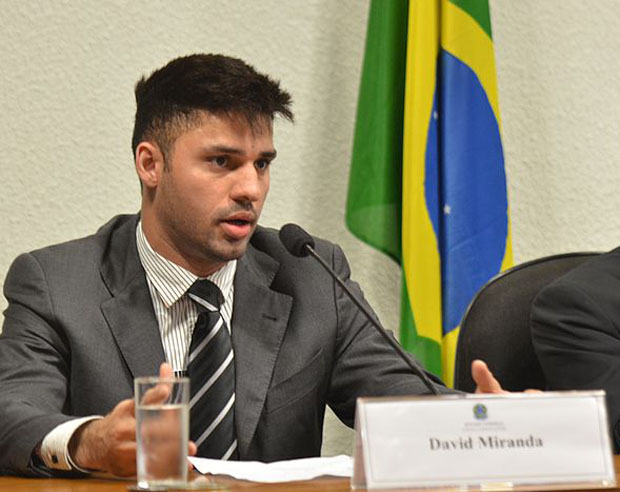19 Feb 2014 | Campaigns, United Kingdom

David Miranda (Image: Elza Fiúza/Agência Brasil/Wikimedia Commons)
Index on Censorship today expressed disappointment at the High Court’s dismissal of David Miranda’s application for a judicial review of the use of anti-terror laws to detain him at Heathrow Airport.
“This ruling represents a dangerous elision of terrorist activity and legitimate journalistic practice,” said Kirsty Hughes, Chief Executive of Index on Censorship. “We must hope that it will not stand as precedent, as it could seriously endanger journalists working in the public interest.”
Mr Miranda, the spouse of journalist Glenn Greenwald, was stopped and searched under Schedule 7 of the Terrorism Act 2000 on 18 August 2013. He had been carrying encrypted files and documents originating from Edward Snowden’s leak of information on the National Security Agency’s mass surveillance programme.
A coalition of media and free speech organisations, including Index on Censorship, argued that it is inappropriate to use terror laws against someone such as Miranda, who was engaged in journalistic activity in transporting the documents intended to be used as source material for news stories in the public interest.
But the High Court today ruled that the use of the Terrorism Act did not infringe David Miranda’s right to free speech, or the rights of journalists to protect sources and materials. In his judgment, Lord Justice Laws ruled that the Schedule 7 detention of Miranda had been proportionate and did not “offend” his right to free speech under the European Convention on Human Rights.
Read the full judgment here
This article was published on 19 February 2014 at indexoncensorship.org
19 Feb 2014 | Africa, Kenya, News and features

(Image: Semmick Photo/Shutterstock)
The Kenyan government’s directive to schools to use tribal mother tongues as the main language of instruction in junior school classes has elicited mixed reactions among the country’s education stakeholders. Teacher’s unions and sections of Kenyan society fear it will promote ethnic division, and separate children along tribal lines.
The unions have come out guns blazing against the directive. The Kenya National Union of Teachers (KNUT) has labelled the directive completely “analogue”, and Secretary General Mr. Wilssion Sossion said they were not consulted before it was issued. He added that the unions cannot be overlooked in these cases, and urged the Ministry of Education to suspend the directive and initiate wider consultations.
Omboko Milemba, the chairman of the Kenya Union of Post Primary Education Teachers (KUPPET), argues that directing teachers to teach in mother tongue at the lower level — class one to three, which come after nursery school and kindergarten — will serve to increase the tribalism that is already rampant in the country.
Teaching in vernacular can only work in rural areas where people from one tribe largely reside in the same place. In urban areas, however, where people from various tribes mingle, as pupils and teachers come from different tribal settings and backgrounds, it will be a challenge to enforce the directive.
Another point being raised is whether there are even enough teachers to implement the plan. According to KNUT the country needs close to 80,000 additional teachers to boost the education sector. There is a further problem in the case of smaller tribes, like the Elmolos and Ogieks, as it will be difficult to get enough teacher who can teach in their languages.
John Wesonga, from the Kakamega County Kenya National Union of Teachers says the government is confusing Kenyans with a lot of poorly planned programmes and directives. He insists they should concentrate on the promise by President Uhuru Kenyatta to give class one pupils laptops, instead of coming up with a new proposal to make Kenyans forget this earlier pledge.
Busia County KNUT branch Executive Secretary Mark Oseno, added that the directive will cause a lot of confusion in the curriculum development if implemented, as it will be applied selectively. “If the disadvantages outweigh the advantages, then it is not advisable to reintroduce mother tongue in lower classes,” he said.
A few of those in support of the plans say exposing children to their mother tongue will help them cope faster with learning a subsequent second language. Those against, however, stress the need for the government to consult education stakeholders across Kenya’s 47 counties, to prevent a plan that will divide pupils along tribal lines.
This article was published on 19 February 2014 at indexoncensorship.org
19 Feb 2014 | Asia and Pacific, Australia, Digital Freedom, News and features

(Image: Shutterstock)
When will Australian governments leave the internet alone? Successive governments have shown an inability to allow Australians to go about the business of using the web and browsing at will. Under previous Labor governments, an obsession grew about the need for a mandatory internet filter system. The system would have screened out sites falling into the “Refused Classification” category. Internet activists and the political opposition guffawed at the suggestion. It was deemed excessive and unworkable.
Australia’s new attorney-general, the prickly George Brandis, claims to be interested in freedoms. He certainly spends time talking about it, having established the new office of “Freedom Commissioner” and claiming that the political left has lost sight of traditional civil rights in favour of select, marginal entitlements. His appointee to the position, Tim Wilson of the libertarian Institute of Public Affairs, is meant to signal a policy shift.
Such a move does little to suggest how actual “freedoms” are going to be protected, let alone promoted. Australia’s legislative regime on rights, in the absence of a constitutionally protected bill of rights, is a quilt work of regulations. These are, as ever, the subject of parliamentary change.
When it comes to internet freedoms, Brandis shows a slightly different suspicion of its workings than his predecessors. But in targeting a form of behaviour he cannot accept, he proves to be on familiar ground. The focus here is not morally righteous in the manner of the pornography filterers, but it is righteous in the sense of protecting financial and economic rights. “The illegal downloading of Australian films online is a form of theft.” Both views share a common strand: a desire to circumscribe the way the net, and information, is used.
Before an audience at the Australian Digital Alliance copyright forum last week, Brandis made mention of how he might go about this. The government will consider various legal means to provide a “legal incentive” for ISPs to collaborate with copyright owners to combat infringements. “This may include looking carefully at the merits of a scheme whereby ISPs are required to issue graduated warnings to consumers who are using websites to facilitate piracy.”
A three-strikes system is being pushed, part of a global drive by developed countries to exert greater control over internet content. France, New Zealand, the United States and Britain are all in the stages of implementing such a program. Users of Australia’s broadband system who allegedly download pirated content will be warned before authorities intervene. This can involve threats of discontinuation from the use of the internet after three warnings. So far, owners of content in Australia have been pressing the government to use a warning system short of disconnection.
The effects of this have already been outlined in some detail. Internet service providers such as iiNet and Optus claim that such a policy move will shift the onus on them to police content. That is Brandis’ suggestion: to convert ISPs into cyber policing outfits that will remove websites hosting “illegitimate” material, thereby restraining downloads by customers.
A few points are worth mentioning. The first is how accountability for infringements can be attributed to an ISP. A ruling by the Australian High Court on the liability of an ISP for allowing the downloading of infringing content is instructive. In 2012, the court unanimously found in a case mounted by 34 studios and television companies against iiNet that the ISP was not liable for authorising copyright infringement.
Roadshow Films v iiNet proved to be a global test case on illegal downloads. It found that iiNet did not have direct power to prevent infringements given its lack of control over the BitTorrent protocol. The only way to prevent violations would have been excessive: eliminating a customer’s Internet access altogether, which would also prevent legitimate uses of it. Indifference to cases of infringement was not the same as authorisation of it. And expecting iiNet to do what the plaintiffs wanted would have resulted in heavy expense, inconvenience and liability for terminating customer accounts.
The other point to make is that such graduated systems are set to fail even as they unduly burden the industry. The experiences in France, New Zealand and the UK have shown them to be counterproductive. Steve Dalby, chief regulatory officer of iiNet, forcefully argues that content should be made available via a system of timely release using such streaming services as Netflix and Hulu. “It can’t be a coincidence that graduated response doesn’t work anywhere else in the world, and making content available in a timely fashion in the US market does work.”
Such suggestions by Brandis cast light on preliminary moves on the part of Australia to import American models of intellectual property law into the domestic system. Australia has been the least disagreeable of the countries involved in negotiating the Trans-Pacific Partnership Agreement with the United States, which contains a substantive chapter on intellectual property.
The intellectual property chapter of the secretly negotiated agreement, obtained by WikiLeaks, suggests the extent the TPP will control the way “protected” content, be it technology, medicine and publishing, will be controlled. Mandatory removals and targeting copyright infringements are fundamental to the changes. The main investors in such an arrangement are US companies who will seek, through the legal regulations in other countries, to control the release of protected material. Aspects of the contentious Digital Millennium Copyright Act have found their way into the agreement.
While the interests of copyright are important to consider, the tendency to control the global Internet via an internationalised copyright regime that coopts ISPs into the role of monitors serves no useful role in preventing infringements. This has the effect of turning a provider of such services into a security service for corporate rights. But it is a trend proving irresistible to all governments, especially those in industrial countries.
This article was posted on February 19, 2014 at indexoncensorship.org
18 Feb 2014 | Europe and Central Asia, News and features, Russia
Homosexuality and LGBT rights have made headlines across the globe during the Sochi Winter Olympics, following Russia’s introduction this summer of laws banning “gay propaganda”.
Index invited Brian Pellot, Director of Global Strategy and Religious Freedom Editor at Religion News Service, and Joel Bedos, International Coordinator for International Day Against Homophobia (IDAHO), to join us for our first ever Drawing the Line Google Hangout, to debate young people’s views on same-sex relationships.
Watch the discussion below and have your say in the comments, or get in touch on Twitter @IndexCensorship using the hashtag #LoveandFEX
This article was published on 18 February 2014 at indexoncensorship.org



